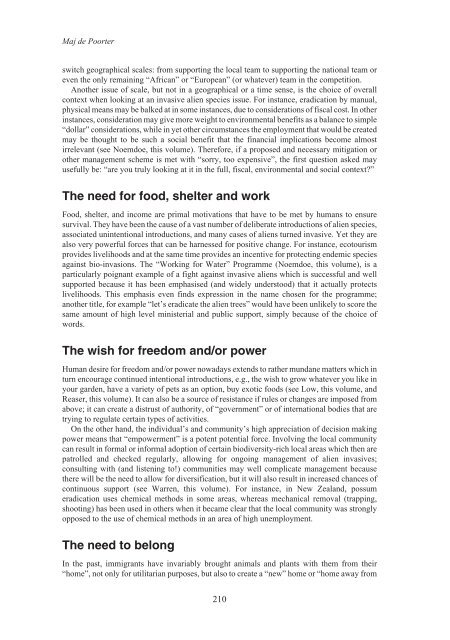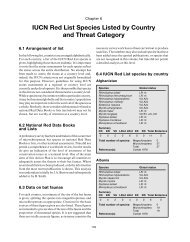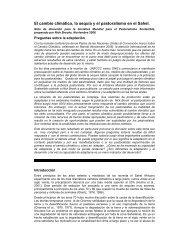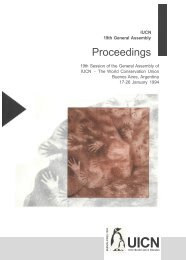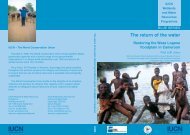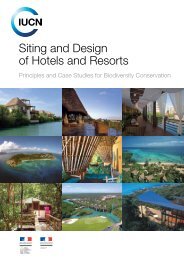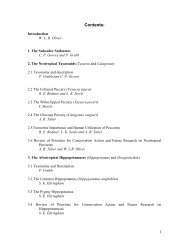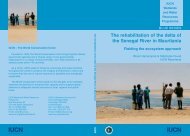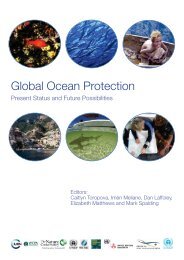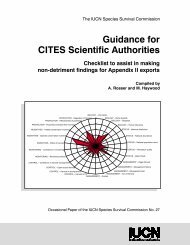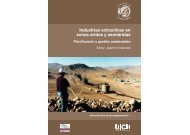Alien Species.vp - IUCN
Alien Species.vp - IUCN
Alien Species.vp - IUCN
You also want an ePaper? Increase the reach of your titles
YUMPU automatically turns print PDFs into web optimized ePapers that Google loves.
Maj de Poorter<br />
switch geographical scales: from supporting the local team to supporting the national team or<br />
even the only remaining “African” or “European” (or whatever) team in the competition.<br />
Another issue of scale, but not in a geographical or a time sense, is the choice of overall<br />
context when looking at an invasive alien species issue. For instance, eradication by manual,<br />
physical means may be balked at in some instances, due to considerations of fiscal cost. In other<br />
instances, consideration may give more weight to environmental benefits as a balance to simple<br />
“dollar” considerations, while in yet other circumstances the employment that would be created<br />
may be thought to be such a social benefit that the financial implications become almost<br />
irrelevant (see Noemdoe, this volume). Therefore, if a proposed and necessary mitigation or<br />
other management scheme is met with “sorry, too expensive”, the first question asked may<br />
usefully be: “are you truly looking at it in the full, fiscal, environmental and social context?”<br />
The need for food, shelter and work<br />
Food, shelter, and income are primal motivations that have to be met by humans to ensure<br />
survival. They have been the cause of a vast number of deliberate introductions of alien species,<br />
associated unintentional introductions, and many cases of aliens turned invasive. Yet they are<br />
also very powerful forces that can be harnessed for positive change. For instance, ecotourism<br />
provides livelihoods and at the same time provides an incentive for protecting endemic species<br />
against bio-invasions. The “Working for Water” Programme (Noemdoe, this volume), is a<br />
particularly poignant example of a fight against invasive aliens which is successful and well<br />
supported because it has been emphasised (and widely understood) that it actually protects<br />
livelihoods. This emphasis even finds expression in the name chosen for the programme;<br />
another title, for example “let’s eradicate the alien trees” would have been unlikely to score the<br />
same amount of high level ministerial and public support, simply because of the choice of<br />
words.<br />
The wish for freedom and/or power<br />
Human desire for freedom and/or power nowadays extends to rather mundane matters which in<br />
turn encourage continued intentional introductions, e.g., the wish to grow whatever you like in<br />
your garden, have a variety of pets as an option, buy exotic foods (see Low, this volume, and<br />
Reaser, this volume). It can also be a source of resistance if rules or changes are imposed from<br />
above; it can create a distrust of authority, of “government” or of international bodies that are<br />
trying to regulate certain types of activities.<br />
On the other hand, the individual’s and community’s high appreciation of decision making<br />
power means that “empowerment” is a potent potential force. Involving the local community<br />
can result in formal or informal adoption of certain biodiversity-rich local areas which then are<br />
patrolled and checked regularly, allowing for ongoing management of alien invasives;<br />
consulting with (and listening to!) communities may well complicate management because<br />
there will be the need to allow for diversification, but it will also result in increased chances of<br />
continuous support (see Warren, this volume). For instance, in New Zealand, possum<br />
eradication uses chemical methods in some areas, whereas mechanical removal (trapping,<br />
shooting) has been used in others when it became clear that the local community was strongly<br />
opposed to the use of chemical methods in an area of high unemployment.<br />
The need to belong<br />
In the past, immigrants have invariably brought animals and plants with them from their<br />
“home”, not only for utilitarian purposes, but also to create a “new” home or “home away from<br />
210


